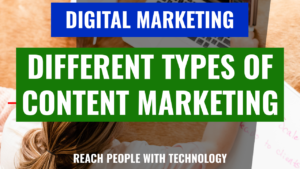Are you searching the internet looking for What are the different types of content marketing? Well, you have come to the right place.

In case you are not aware, content marketing has emerged as a crucial tool for businesses to engage with their target audience, build brand awareness, and drive customer acquisition.
Understanding the various types of content available and tailoring them to your specific business needs can significantly enhance the effectiveness of your content marketing strategy.
In this blog post, we will define content marketing, explore its effectiveness, and we will take a look into the different types of content that can be harnessed to achieve optimum results.
Are you ready? Let's go.
I. Defining Content Marketing: Laying the Foundation for Success
Content marketing refers to the strategic process of producing and distributing valuable, relevant, and consistent content with the objective of attracting and retaining a clearly defined audience.
It encompasses the creation and sharing of content, such as blog posts, videos, infographics, social media updates, and more.
The ultimate goal of content marketing is to drive profitable customer action while establishing long-term brand loyalty.
II. The Power of Effective Content Marketing: Achieving Business Goals
Effective content marketing serves as a catalyst for small businesses to accomplish their objectives by cultivating meaningful relationships with prospects and customers.
It allows businesses to educate, inform, entertain, and inspire their audience, creating a positive impact on their purchasing decisions.
By customizing content to cater specifically to the needs, wants, and pain points of their target audience, businesses can establish their authority and credibility within their industry.
III. Business Content Marketing: Types of Content for Success
1. Blog Posts and Articles:
Blog posts and articles are central to any content marketing strategy. They provide a platform for businesses to share valuable information, industry insights, and expertise on various topics related to their niche.
This type of content allows businesses to showcase their thought leadership, attract organic traffic, and engage with their audience through comments and social media.
2. Videos and Webinars:
Videos and webinars have gained popularity as powerful mediums for content marketing.
With video content, businesses can create captivating storytelling experiences, product demonstrations, interviews, and tutorials to convey their message effectively.
Webinars are especially useful for hosting interactive sessions where businesses can educate their audience, answer questions, and demonstrate expertise in real-time.
3. Infographics and Visual Content:
Infographics and visual content grab attention and simplify complex information, making it easier for the audience to understand and remember.
By utilizing visually appealing elements such as charts, graphs, and images, businesses can present data-driven insights or explain complicated processes in a concise and engaging manner.
4. Social Media Content:
Social media platforms enable businesses to reach a vast audience and foster conversations around their brand.
Through well-crafted social media posts, including text, images, and videos, businesses can share relevant content, engage with their followers, and build an online community.
Platforms such as Facebook, Instagram, LinkedIn, and Twitter offer unique opportunities to connect with diverse target audiences.
5. E-books and Whitepapers:
E-books and whitepapers go beyond blog posts and articles by offering in-depth, comprehensive information on a particular subject.
These resources can be used to capture leads by offering valuable insights or solutions in exchange for contact information, allowing businesses to nurture prospects into customers.

Conclusion
To harness the full potential of content marketing, businesses must understand the different types of content available and choose those that align with their target audience and overall business goals.
By incorporating a blend of blogs, videos, infographics, social media content, e-books, and other relevant content formats, businesses can achieve higher engagement, increased brand awareness, and, ultimately, better conversion rates.
Remember, successful content marketing stems from understanding your audience, delivering value, and consistently creating high-quality content across various channels.
If you have questions, please post them in the comment section below and I would love to assist where I can.
Cheering you on for success!